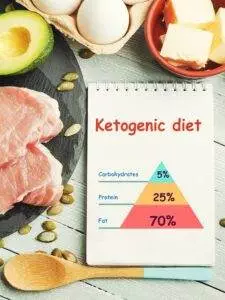
The Ultimate Guide to Balanced Ketogenic Dieting
Why Try a Ketogenic Diet?
A ketogenic diet, also known as the low-carb high-fat (LCHF) diet, is a nutritional approach that involves reducing carbohydrate intake and increasing fat consumption. The goal of this type of diet is to induce ketosis, which occurs when your body burns stored fats instead of glucose for energy. This can lead to weight loss, improved blood sugar control, and other health benefits.
Balanced Macro Breakdown for Optimal Results
To achieve optimal results on a keto diet, you should aim for a balanced macro breakdown consisting of approximately 70% fat, 25% protein, and 5% carbs.

This macronutrient distribution will help ensure that you are getting enough essential nutrients while still staying in ketosis. It’s important not to go overboard with proteins or consume too many carbs, as this could disrupt ketosis and negate any potential benefits.
The Importance of Hydration and Electrolytes on the Keto Diet
Staying hydrated and maintaining proper electrolyte levels is crucial when following a ketogenic diet. Because your body is burning more fat than usual, it produces more waste products that need to be flushed out through urination and sweating. Additionally, consuming a high-protein diet can increase fluid losses from the kidneys. To avoid dehydration and electrolyte imbalances, make sure to drink plenty of water throughout the day and consider supplementing with electrolytes such as sodium, potassium, magnesium, and calcium.

Imagine a world where you could enhance your daily hydration routine, not just quenching your thirst, but also boosting your overall health. That’s the power of hydrogenated water, a unique blend of pure water and extra hydrogen molecules. This isn’t just any water, it’s a sip towards a healthier lifestyle.
With every gulp, you’re unlocking potential health benefits. From increasing your energy levels to slowing down the aging process, and even improving muscle recovery after a workout. But that’s not all. Preliminary studies suggest that hydrogen water may contain antioxidants that help prevent oxidative stress, which could lead to various diseases.
Now, you have the opportunity to experience these benefits for yourself. Click here to learn more about hydrogenated water and how it can be a part of your journey towards a healthier lifestyle. Remember, it’s not just about staying hydrated, it’s about drinking smarter with hydrogenated water.
Nutrient Density: Eating Well While on the Keto Diet
While on a ketogenic diet, it’s important to focus on eating whole foods that provide a wide range of essential vitamins and minerals. Some examples include leafy greens like spinach and kale, colorful vegetables like bell peppers and broccoli, nuts and seeds, avocado, olives, oily fish like salmon and sardines, and grass-fed meats like beef and lamb. By incorporating these nutrient-dense foods into your diet, you can support overall health and wellbeing even while following a restrictive dietary approach like keto.
Supplements to Consider When Following a Ketogenic Diet
There are several supplements that may benefit those following a ketogenic diet. These include:
MCT oil: Medium-chain triglycerides (MCTs) are a source of quick-burning fuel that can help support ketone production. They can also improve cognitive function and reduce appetite.
Exogenous ketones: These supplements can help put your body into ketosis faster by providing additional ketone bodies. They may also enhance physical performance and mental clarity.
Grass-fed butter: Butter is a good source of healthy fats and antioxidants that can support immune function and promote skin health.
In summary, a balanced macro breakdown, adequate hydration and electrolyte replacement, and focusing on nutrient-dense whole foods are all key components of a successful ketogenic dieting strategy. With careful planning and attention to detail, you can enjoy the many potential benefits of this popular dietary approach without sacrificing overall health and wellness.

